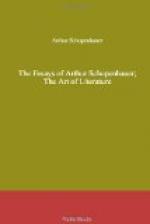An author like this, who has a claim to the continuance of his life even with posterity, can only be a man who, over the wide earth, will seek his like in vain, and offer a palpable contrast with everyone else in virtue of his unmistakable distinction. Nay, more: were he, like the wandering Jew, to live through several generations, he would still remain in the same superior position. If this were not so, it would be difficult to see why his thoughts should not perish like those of other men.
Metaphors and similes are of great value, in so far as they explain an unknown relation by a known one. Even the more detailed simile which grows into a parable or an allegory, is nothing more than the exhibition of some relation in its simplest, most visible and palpable form. The growth of ideas rests, at bottom, upon similes; because ideas arise by a process of combining the similarities and neglecting the differences between things. Further, intelligence, in the strict sense of the word, ultimately consists in a seizing of relations; and a clear and pure grasp of relations is all the more often attained when the comparison is made between cases that lie wide apart from one another, and between things of quite different nature. As long as a relation is known to me as existing only in a single case, I have but an individual idea of it—in other words, only an intuitive knowledge of it; but as soon as I see the same relation in two different cases, I have a general idea of its whole nature, and this is a deeper and more perfect knowledge.
Since, then, similes and metaphors are such a powerful engine of knowledge, it is a sign of great intelligence in a writer if his similes are unusual and, at the same time, to the point. Aristotle also observes that by far the most important thing to a writer is to have this power of metaphor; for it is a gift which cannot be acquired, and it is a mark of genius.
As regards reading, to require that a man shall retain everything he has ever read, is like asking him to carry about with him all he has ever eaten. The one kind of food has given him bodily, and the other mental, nourishment; and it is through these two means that he has grown to be what he is. The body assimilates only that which is like it; and so a man retains in his mind only that which interests him, in other words, that which suits his system of thought or his purposes in life.
If a man wants to read good books, he must make a point of avoiding bad ones; for life is short, and time and energy limited.
Repetitio est mater studiorum. Any book that is at all important ought to be at once read through twice; partly because, on a second reading, the connection of the different portions of the book will be better understood, and the beginning comprehended only when the end is known; and partly because we are not in the same temper and disposition on both readings. On the second perusal we get a new view of every passage and a different impression of the whole book, which then appears in another light.




